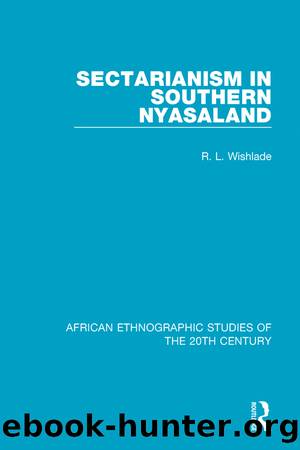Sectarianism in Southern Nyasaland by R. L. Wishlade

Author:R. L. Wishlade [Wishlade, R. L.]
Language: eng
Format: epub
Tags: Social Science, Ethnic Studies, African Studies, Anthropology, General
ISBN: 9780429895302
Google: rRFqDwAAQBAJ
Publisher: Routledge
Published: 2018-09-03T03:40:31+00:00
Wendewende Mission,
P. O. Box 562,
Limbe.
It is not merely a question of postal convenience, as the address is a P. O. box number.
The duties of a village headman fall into three broad categories, ritual, administrative, and judicial. His ritual role is now of limited importanceâmany village headmen are Christians, offerings are only occasionally made to the spirits of deceased headmen, and only a small proportion of adolescents are now initiated (the right to hold initiation ceremonies was previously the privilege of certain headmen).
The headman is responsible for ensuring that Government regulations are kept in his village, particularly those concerning payment of tax, sanitation, clearing of paths, etc. He also allocates land to elementary families living in the village and gives permission for immigrants to settle within its boundaries.
Each headman has an open space (bwalo) where he hears disputes involving members of his village. This was a traditional function of a headman, but I have not come across any examples of a nyakwawa holding such a court except where he had been instructed to do so by a headman in his absence. The headmanâs role in such disputes is still that of a mediator; he has no power to enforce a settlement on unwilling parties, but all cases taken to the Native Authority court should previously have been heard by the village headman and he may be called as a witness. Most of the cases coming before the headman are disputes between spouses or affinal relatives or involve fighting or bad debts.
The village headman receives a small payment from the Government for helping to ensure that taxes are paid, but the amount is insufficient to differentiate his living standards from those of the villagers under him. If a beer drink is being held in his village, he may receive a pot of beer, but this will depend upon his popularity.
As bureaucratic officials in the administrationâs hierarchy, the village headman and the Native Authority are in a more powerful position than the traditional political officials. Where previously the chief could do little with disobedient subjects he now can, and does, employ sanctions backed by the administration and has an executive force of messengers to ensure that his orders are carried out. Likewise the village headman is in a stronger position. On more than one occasion I have heard a village headman haranguing villagers with threats of taking them to the chief and reporting them to the District Commissionerâapparently with some effect.
The position of Native Authority carries with it a great deal of prestige, and so to a lesser extent does the office of a village headman recognized by the administration; the position of nyakwawa carries little. These bureaucratic offices in the administrationâs hierarchy are still the focus of competitionâbut it is no longer possible for all those aspiring to positions of leadership to succeed in this sphere. The whole of the province is divided into Native Authority areas and there are no opportunities for creating new ones. Under the present system only a
Download
This site does not store any files on its server. We only index and link to content provided by other sites. Please contact the content providers to delete copyright contents if any and email us, we'll remove relevant links or contents immediately.
Man-made Catastrophes and Risk Information Concealment by Dmitry Chernov & Didier Sornette(5992)
The Revenge of Geography: What the Map Tells Us About Coming Conflicts and the Battle Against Fate by Kaplan Robert D(4063)
Zero Waste Home by Bea Johnson(3829)
COSMOS by Carl Sagan(3612)
Good by S. Walden(3543)
In a Sunburned Country by Bill Bryson(3526)
The Fate of Rome: Climate, Disease, and the End of an Empire (The Princeton History of the Ancient World) by Kyle Harper(3051)
A Wilder Time by William E. Glassley(2852)
Camino Island by John Grisham(2788)
Organic Mushroom Farming and Mycoremediation by Tradd Cotter(2681)
The Ogre by Doug Scott(2672)
Human Dynamics Research in Smart and Connected Communities by Shih-Lung Shaw & Daniel Sui(2490)
Energy Myths and Realities by Vaclav Smil(2480)
The Traveler's Gift by Andy Andrews(2447)
9781803241661-PYTHON FOR ARCGIS PRO by Unknown(2357)
Inside the Middle East by Avi Melamed(2347)
Birds of New Guinea by Pratt Thane K.; Beehler Bruce M.; Anderton John C(2245)
A History of Warfare by John Keegan(2230)
And the Band Played On by Randy Shilts(2183)
